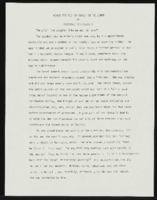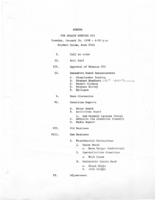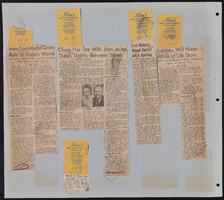Search the Special Collections and Archives Portal
Search Results

"Never Too Old To Forget Or To Learn": short story by Roosevelt Fitzgerald
Date
Archival Collection
Description
From the Roosevelt Fitzgerald Professional Papers (MS-01082) -- Short stories and poems by Roosevelt Fitzgerald file.
Text

Mario C. Monaco interview, March 12, 1981: transcript
Date
Archival Collection
Description
On March 12, 1981, Kim Rhodes interviewed Mario C. Monaco (born in Italy) about his life as an educator in Las Vegas, Nevada. During the interview, Monaco speaks about his various teaching positions, how he ended up in Las Vegas, the changes seen in the Clark County School District and how it compares to educational districts throughout the nation. Moreover, Monaco discusses wages and teacher education opportunities, sports and extracurricular activities in school, community involvement, and racial integration through busing. Lastly, Monaco talks about his appointment to Director of Vocational Education in the Clark County School Districts, the programs offered by the vocational center in the valley and the importance of education.
Text

Meeting minutes for Consolidated Student Senate, University of Nevada, Las Vegas, January 24, 1978
Date
Archival Collection
Description
Text

Interview with Native American Forum on Nuclear Issues, April 10, 2008
Date
Archival Collection
Description
Text

Andres Dominguez oral history interview: transcript
Date
Archival Collection
Description
Oral history interview with Andres Dominguez conducted by Marcela Rodriguez Campo, Laurents Bañuelos-Benitez, and Barbara Tabach on February 11, 2019 for the Latinx Voices of Southern Nevada Oral History Project. In this interview, Dominguez discusses his upbringing in Las Vegas, Nevada and growing up on the Eastside. He talks about the history of barbering in his family, and his path to becoming a barber. Dominguez describes the process of acquiring the barbershop at the El Cortez Hotel and Casino, and the significance of the location to his family. Lastly, Dominguez discusses his perspective on life, the importance of networking, and his decision in naming his shop Speakeasy Barbershop LV.
Text

James L. Hogan interview, March 11, 1978: transcript
Date
Archival Collection
Description
On March 11, 1978, collector Patty L. Baratti interviewed James Hogan (born April 6th, 1909 in Winton Place, Ohio) at his home in Las Vegas, Nevada. In this interview, Hogan talks about his time working with the telephone company in Arizona and moving to Las Vegas, Nevada. He discusses his time working on grazing rights and cattle ranching in Nevada and how planning went to ensure that farms were able to have land to graze their animals. He speaks about dealing with farmers, corporations, and the government and the frustrations he had to deal with before there were set laws about grazing. He also discusses the change from mainly family farms in Nevada to corporations owning much of the farmland.
Text

Preprint, Where I Stand: The Record of a Reckless Man, by Hank Greenspun with Alex Pelle, 1966
Date
Archival Collection
Description
Book proof with annotations from editors in the margins.
Text

Transcript of interview with Frankie Perez by Elsa Lopez and Laurents Bañuelos-Benitez, November 5, 2018
Date
Archival Collection
Description
Frankie Perez (1986- ) is an individual that constantly found himself navigating two worlds, whether it was military versus civilian; female versus male; or being Latinx in the United States. As a result of this navigation, Perez has a unique perspective on our ever more complicated world that not many individuals possess. Perez served in the military during the Do Not Ask, Do Not Tell policy which made it difficult for someone dealing with gender identity, to seek out the proper support they need. Despite the policy, and other policies that were put in place afterwards to inhibit the transgender community in the military, Perez began his transition while still serving his country. In direct contradiction of popular opinion, Perez discovered that the military easily accommodated his transition. Outside of the military Perez is an active voice in the LGBTQ community. As a member of the LGBTQ, Latinx, and military community, Perez has a unique perspective that he uses to fight for both LGBTQ and Latinx rights. Currently, Perez is finishing his degree in gender and sexuality studies at UNLV. He hopes to use his education to help people have the difficult discussions and improve conditions for his communities.
Text

Transcript of interview with Midge Innis by James Thomas Griffin, May 8, 1976
Date
Archival Collection
Description
On May 8, 1976, James Thomas Griffin interviewed former casino dealer Midge Innis (born September 23rd, 1928 in Neligh, Nebraska) in her apartment in Las Vegas, Nevada about her life in Southern Nevada. The two discuss her occupational history as well as how she met her husband. The interview concludes Innis’ thoughts on environmental and social shifts in Las Vegas.
Text

